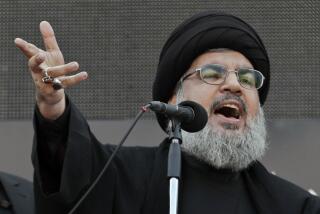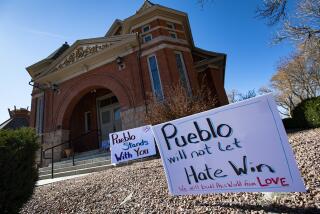Why Islamic State’s Abu Muhammad Adnani was much more than a spokesman
Lone wolves and Islamic State’s most lethally trained operatives alike heeded his words -- and turned them into bloody deeds.
Abu Muhammad Adnani, whose death was announced Tuesday by the extremist group, was a chief architect of its war against the West. He exhorted European-born fighters to commit attacks on home ground rather than joining the fight in Syria and Iraq – and pointed the way for those with no ties to the group to embrace “martyrdom” on its behalf.
Adnani was killed while overseeing Islamic State field operations in northern Syria, the group said. Pentagon spokesman Peter Cook confirmed late Tuesday that Adnani was targeted in an airstrike in Al Bab, Syria, but could not confirm his death.
If Adnani has been killed, his death represents a significant loss for the Sunni Muslim militant group, which has been losing territory in its heartland straddling Syria and Iraq.
The charismatic 39-year-old was not only deeply involved in the group’s larger operational strategies, but in articulating its message in a way tailored to appeal to the angry and disaffected, giving them a sense of mission and purpose. A number of homegrown assailants – untrained but radicalized, with no formal affiliation to Islamic State – are believed to have drawn inspiration from his rhetoric.
While the attackers’ motivations may never fully be known, Adnani’s reign as the militant group’s chief agitator saw lone wolf attacks erupt across continents. Syed Rizwan Farook and Tashfeen Malik opened fire at a holiday potluck at the Inland Regional Center in San Bernardino on Dec. 2, 2015, killing 14 people; the couple had no previous ties to terrorists. Omar Mateen killed 49 at the Pulse nightclub in Orlando, Fla., on June 12; he pledged allegiance to Islamic State in a phone call to 911, but was not believed to have had any formal contact with the group.
In some instances, the connection has been explicit. In a case last year in New York state, court papers documented online praise for Adnani by a defendant, Arafat Nagi, who was charged with trying to provide material support to a foreign terrorist group.
The significant operations carried out on his watch include the Paris attacks, the Brussels airport attack, the Istanbul airport attack, the downing of the Russian airliner in the Sinai, the suicide bombings during a rally in Ankara, and the attack on a cafe in Bangladesh. In total, these attacks killed more than 1,800 people and wounded nearly 4,000.
“He’s definitely one of the most senior officials, and probably the most visible,” said Thomas Joscelyn, a senior fellow at the Foundation for Defense of Democracies and senior editor of the Long War Journal. “To call him a spokesman kind of downplays how important he was.”
Adnani helped orchestrate the group’s attacks against Western targets, and urged fighters with European passports to take advantage of their ability to move about Europe – a crucial component in the Paris attacks in November, in which 130 people died in strikes on a concert hall, a stadium and several nightspots.
Using social media and militant-affiliated sites as a platform, he was a font of inflammatory rhetoric, calling on all Muslims to avenge themselves against the U.S.-led coalition formed to confront the group. Speaking in impeccable classical Arabic, Adnani would mock Islamic State’s opponents even when the group suffered defeats on the battlefield.
One of his trademark declarations came in September 2014, when he urged followers to take up arms everywhere, even with the crudest of weapons. In that address, nearly two years before the truck rampage in the French Riviera city of Nice that killed 86 people on July 14, Adnani had specifically urged the use of vehicles in attacks.
“If you can kill a disbelieving American or European — especially the spiteful and filthy French — or an Australian, or a Canadian, or any other disbeliever from the disbelievers waging war, including the citizens of the countries that entered into a coalition against the Islamic State, then … kill him in any manner or way however it may be,” he said.
“Smash his head with a rock, or slaughter him with a knife, or run him over with your car, or throw him down from a high place, or choke him, or poison him.”
In May, heading into the Muslim month of prayer and fasting, Adnani delivered an audio message released by Islamic State’s media arm calling for redoubled violence by the group’s faithful, and promising the particular rewards of martyrdom for carrying out attacks timed to the holy month of Ramadan.
“The tiniest action you carry out in the heart of their land is dearer to us than the biggest action by us,” he asserted. “There are no innocents … in the lands of the crusaders.”
Experts likened his words to the lighting of a fuse. “He said, in calling for attacks, ‘Do whatever you can, however you want, with whatever means you have,’” said Seamus Hughes, the deputy director of the Program on Extremism at George Washington University.
He said most suspected Islamic State sympathizers arrested in the United States, about 200 to date, had shown awareness of Adnani’s views; nearly all had often downloaded his speeches and statements.
On the operational side, Adnani was thought to have played a key role in the group’s operations network outside Iraq and Syria, known as the Emni. He is believed to have been closely involved in vetting external groups that sought permission to declare themselves “provinces” of Islamic State in areas like Egypt’s Sinai Peninsula, or war-ravaged Libya next door. He also facilitated and announced Boko Haram’s pledge of allegiance to Islamic State in 2015.
Hughes termed Adnani’s death a “significant blow” to the group because his oratorical skills were coupled with deep involvement in operational matters.
“He was in a special category, much more than just a propagandist,” he said.
That assessment was shared by others in the intelligence community. “No single battlefield defeat or the loss of a leader will end the threat posed by ISIS and the adherents to its hateful ideology; but if confirmed, the loss of Adnani is further evidence that the military campaign against ISIS is making important progress,” Adam B. Schiff (D-Burbank), the top Democrat on the House Intelligence Committee, said in a statement.
According to the U.S. State Department’s Rewards for Justice Program, which offers bounties for known terrorists, Adnani is the Islamic State’s “main conduit for the dissemination of official messages.”
The program last year offered $5 million for information leading to his capture — the eighth-highest reward for any terrorist.
He was at the top of the “kill list” of top-ranking militants targeted in a U.S. military campaign, run by the secretive Joint Special Operations Command, that has killed more than 120 Islamic State leaders, commanders, propagandists, recruiters and other so-called high-value individuals so far this year. The program runs separately from the U.S.-led coalition that provides financial support, military training and airstrikes for allied forces in Iraq and Syria. Those killed this year include Omar Shishani, Islamic State’s minister of war; Rahman Mustafa Qaduli, its minister of finance; and Abu Wahib, military emir for Iraq’s Anbar province.
Adnani was born in the northwestern Syrian city of Binnish. In his early years he was repeatedly detained by Syrian authorities for proselytizing and jihadi activities, according to a biography published by Islamic State’s Abu Turki bin Mubarek al-Benali in November 2014.
In 2000, he managed to contact and pledge his allegiance to Abu Musab Zarqawi, the Jordanian-born jihadi leader notorious for savage attacks on Iraq’s Shiite Muslim population, and the spiritual godfather of Islamic State. Adnani would later be among the rare few within Islamic State to have had a personal relationship with Zarqawi.
He was one of the first foreign fighters to join the insurgency against the U.S. occupation of Iraq in 2003. Adnani crossed the border and led the takeover of the city of Haditha, reportedly transforming it into an insurgent haven that applied the harsh interpretation of sharia, or Islamic law, now applied in areas Islamic State control. He rose from commanding the city to being the top cleric of western Anbar.
According to his biography, he was arrested twice by the coalition, and imprisoned for about six years at the U.S.-maintained Camp Bucca, along with other Zarqawi lieutenants. Many other prisoners there went on to senior positions in Islamic State. During his time there, he managed to hide his prominent role in jihadi circles from his captors by going under a pseudonym.
Upon his release, he was appointed as spokesman of the Islamic State of Iraq, the progenitor of Islamic State. By that time, Syria was already descending into the chaos teetering into the bloodbath that would characterize the dark side of the “Arab Spring” revolutions and provide the safe haven necessary for Islamic State’s resurgence. Adnani was reportedly dispatched to create the Al Qaeda affiliated Nusra Front, the one-time ally-turned-nemesis of Islamic State.
It was Adnani who informed the world in June 2014 that the nascent group had established a “caliphate” led by Abu Bakr Baghdadi, which swiftly seized the world’s attention with brutal tactics – beheadings, crucifixions, sexual slavery and baroque means of torture. In a dramatic video released the same month, Adnani and other Islamic State officials are seen smashing the border crossing between Syria and Iraq’s Nineveh province.
Islamic State vowed vengeance against those under “the banner of the cross” -- its code for the West.
Adnani’s death, it said, would only increase the group’s “steadfastness on the path of jihad.”
Times staff writers King and Hennigan reported from Washington and special correspondent Bulos from Beirut.
ALSO:
Why Iran is desperate for U.S. passenger planes, but can’t have them
Apple must pay $14.5 billion in back taxes to Ireland, the EU says
Juan Gabriel was Mexico’s gay icon — but he never spoke of his sexuality
UPDATES:
5:15 p.m.: Updated with Times reporting.
This article was originally published at 11:35 a.m.
More to Read
Sign up for Essential California
The most important California stories and recommendations in your inbox every morning.
You may occasionally receive promotional content from the Los Angeles Times.












